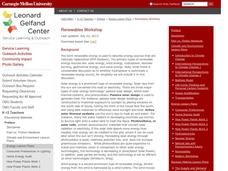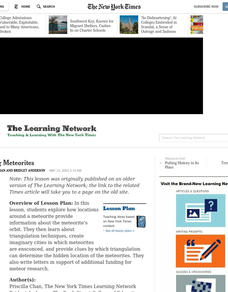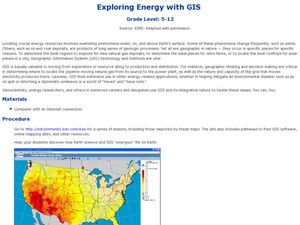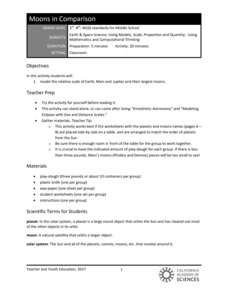Carnegie Mellon University
Renewables Workshop
Youngsters examine resource maps to find out which states are using solar and wind power and discuss as a class various other renewable energy sources. They use a provided data table to record pros and cons to each technology, build and...
Space Awareness
Meet Our Neighbors: Sun
The sun isn't just a ball of yellow! Young scientists learn about the features of the sun using a hands-on modeling activity. They build models of the sun using common household items to represent sunspots, solar prominence, and the...
Curated OER
Energy Solutions; A Brochure
By creating an energy brochure, teams of science learners inform others about the advantages of using alternative energy sources. An instructions page for your class and a grading rubric are provided. The lesson focuses on photovoltaics,...
Curated OER
Orienting a Photovoltaic Cell
By mounting a light bulb on a stand and a PV cell on another, physics apprentices experiment with the angle of incidence. Their goal is to determine the optimum angle for collecting solar energy. The use of a scientific calculator is...
California Academy of Science
Modeling Eclipses with Size and Distance Scales
Size within the solar system is a difficult thing for pupils to imagine. Using everyday objects, they build models to show the scale between the sun, moon, and Earth. They situate their props in proportional distances between the objects...
Curated OER
Bringing the Solar System to Life
Students make models of the planets and use the models to show revolution of the planets around the sun. They explain the rotation of the planets after demonstrating with balloons.
Curated OER
Using Photovoltaic Cells and Systems
This interesting document suggests nine different activities for shedding light on photovoltaic cells. A bit of background information is furnished for you, as well as many, many resource links. Listed for each activity are a learning...
Curated OER
The Discovery of the Solar System
Students explain the observed motion of the planets. The inner ones move back-and-forth across the position of the Sun, while the outer ones usually advance in one direction, but with occasional temporary reversals known as "retrograde...
Curated OER
Our Solar System
Sixth graders use the internet to examine the different bodies in space. In groups, they select one project they want to complete and are given a timeline for when the sections are due. To end the lesson, they present their information...
Curated OER
The Best of the Solar System - Planetary Research
Students increase their ability to recognize the planets and their surface features. In this exploratory activity students focus on details by studying uncaptioned images.
Curated OER
Best of the Solar System
Students visit a site which provides images to be analyzed. Notes are taken and planets are named based on observed features and observations. Using peer review, they try to determine the identity of the planets. They are free to browse...
Curated OER
Mapping Meteorites
After reading an article, "Cameras Capture a 5-Second Fireball and Its Meteorite's Secrets," space science superstars use the triangulation method to determine the location of a distant object. In-class activities and homework are...
Teach Engineering
Get Me Off This Planet
What do Newton's Laws have to do with getting from Earth to Mars?The activities in this resource show how Newton's Laws work with rockets to get them into space. Background information includes facts about orbits and how orbits are used...
Curated OER
Sky Watching
Students complete night-sky observations to understand how our knowledge of the sky has been enhanced by telescopes. Students complete a timeline worksheet giving the history of telescopes. Students then then make their own observations...
Curated OER
Extraterrestrials Visit Earth
Students compare the unique characteristics of Earth to other planets and then write descriptions of Earth that might attract fictional extraterrestrials to visit the planet. They design an appealing travel brochure that incorporates the...
Curated OER
Exploring Energy with GIS
Young scholars examine GIS technology as it is used to locate energy sources. In this GIS lesson, student access an assigned website to locate a series of lessons using the GIS software. They use the maps that are located on the primary...
Curated OER
Getting to Know Saturn: The Saturn System
Learners compare and contrast Earth and Saturn's planet features. In this space science lesson plan, students draw a diagram of the solar system and identify the different components. They complete a Saturn system scavenger hunt and Venn...
NASA
Dark Matter NASA Conference
Young scholars calculate the escape velocity of planets in our solar system and use that knowledge to calculate the escape velocity for NGC 2300 group. They then suggest reasons for the escape velocity to be higher than possible given...
Curated OER
Spacing Out the Solar System
Sixth graders practice applying their problem-solving skills as they measure circular objects and make connections to planets. They identify and describe measurable attributes of objects and units of measurement and solve problems...
California Academy of Science
Moons in Comparison
Just how big is Earth's moon? With a hands-on simulation, scholars use Play-Doh to model the sizes of the planets Earth, Mars, Jupiter, and their moons. They make predictions as a class, work together to make their models, and discuss...
Teach Engineering
Energy Resources and Systems
We've talked a lot about energy, but where does energy come from? Pupils brainstorm different energy sources through a class discussion to kick off the 14th installment of a 25-part Energy Systems and Solutions unit. They then research...
Curated OER
Solar Cycle
Students explore the solar cycle through a series of experiments. In this space science lesson, students construct and evaluate solar cycle graphs. They explain how this phenomenon affects the Earth.
Curated OER
Constellations
Middle schoolers explore the major constellations. After reviewing the Earth's basic motions and their significance, students discuss the moon's orbit and revolutions. Using a Digitarium Alpha portable planetarium projector, they...
Curated OER
Physical Science: Solar Energy
Students review and discuss how Solar energy and electricity produce light and heat. They create a photo/picture journal and include pictures taken during solar energy activities to a PowerPoint slide presentation.
Other popular searches
- Solar System Crossword
- Solar System Worksheets
- Solar System Word Search
- Solar System Art
- The Solar System
- Solar System Lesson Plans
- Solar System Math
- School Projects Solar System
- Components of the Solar System
- Solar System Model
- Earth Movement Solar System
- Solar System Constellations

























